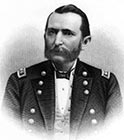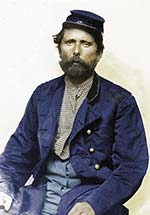The Commander's Congratulations to the Troops
Yesterday afternoon, while the volunteers were out on dress parade, the following order was read by Adjutant Ustick:.
Headquarters, District of Utah
Camp Douglas, Utah Territory, February 6th, 1863.

The Colonel commanding has the pleasure of congratulating the troops of this post upon the brilliant victory achieved at the Battle of Bear River, Idaho Territory.
After a rapid march of four nights in tensely cold weather, through deep snow and drifts, which you endured without murmur or complaint, even when some of your numbers were frozen with cold, and faint with hunger and fatigue, you met an enemy who have heretofore, on two occasions, defied and defeated regular troops, and who have for the last fifteen years been the terror of the emigrants, men, women and children and citizens of those valleys, murdering and robbing them without fear of punishment.
At daylight, on the 29th of January, 1863, you encountered the enemy, greatly your superior in numbers, and had a desperate battle. Continuing with unflinching courage for over four hours you completely cut him to pieces, captured his property and arms, destroyed his stronghold and burned his lodges.
The long list of the killed and wounded is the most fitting eulogy on your courage and bravery. The Colonel commanding returns you his thanks. The gallant officers and men who were engaged in this battle, without invidious distinction, merit the highest praise. Your uncomplaining endurance and unexampled conduct on the field, as well as your thoughtful care and kindness for the wounded, is worthy of emulation. While we rejoice at the brilliant victory you have achieved over your savage foe, it is meet that we do honor to the memory of our brave comrades, the heroic men who feel, fighting to maintain the supremacy of our arms. We deeply mourn their death, and acknowledge their valor.
While the people of California will regret their loss, they will do honor to every officer and soldier who has by his heroism added new laurels to the fair escutcheon of the state.
By order of Colonel Connor,
Wm. D, Ustick
First Lieut. and Adjutant, Third Infantry, California Volunteers, Acting Assistant Adjutant-General.
What names have been particularly mentioned in the official returns of the expedition to General Wright, the commander of the Pacific Department, has not transpired, but in an address to his troops, who so valiantly fought, and who carry with them from the field so many evidences of the bloody struggle, the commander could not well have made signal mention of particular persons. There is nothing but evidences of bravery everywhere and one man was a much exposed as the other. Officers and men stood bravely to their task, and as a body deserve the best of the state they represent. In addition to the names I mentioned, it will not be invidious to give the name of Major P.A. Gallagher as an officer who particularly distinguished himself in the battle. He was there without command, as a volunteer aid to the commander and yet, though unattached to any particular body of Volunteers, he led fearlessly on to their task several detachments who were temporarily assigned to his leadership, and when relieved from those duties, was seen riding everywhere, up and down, at the command of both Major McGarry and Colonel Connor. I know that both of these veteran officers are much pleased with the services of the young major on that occasion.

When the fight was over, and several of the officers were together, the commander acknowledged and complimented him on his gallant services. He now lies in Major McGarry's quarters; but, with proper care and discretion on his part, will probably be able to report for duty in the course of a few weeks. In my last I gave instances of personal coolness and daring; I should have added one other in favor of Major Gallagher. An Indian had been doing considerable harm to the command, and evidently was enjoying his labors free from danger. The Colonel, annoyed by the savage's success, called to the major to shoot him. In a moment the major was after him, and shot him down with his revolver, in the face of his red brethren, who had apparently singled out the gallant officer for their fire. As he wheeled his horse, the Major's cap blew off, and he coolly dismounted, picked it up, and remounted. Seeing that Indian crowd preparing for the Major the Colonel shouted to him to take care, and before the Indian triggers were touched the Colonel ordered the men to fire upon them and saved the Major.
In terminating my letters on the Battle of Bear River, and its various and multifarious sequels, it is proper to say that whatever may be thought of it abroad, there is but one sentiment here, it was a desperate fight, and one that reflects the highest credit upon the entire expedition. The Colonel exhibited high qualities of command, and his perfect coolness and bravery are the universal theme of praise. Possibly, some might have been better pleased with less exposure of their command; but I have the best authority for saying it was the call of duty and not indifference. It is a fact worthy of mention that no soldier there ever saw more deadly foes than those that greeted the volunteers as they approached the Indian ravine. Now that the battle is won, and the testimony of the Volunteers' undisputed bravery is engraved in history, it can injure nothing to admit that so deadly were the first volleys of the Indians, and so little could be done in return with a sneaking, lurking, concealed foe, that had the order been given to retire,
it could scarcely have been done without a demoralizing effect, if not worse. Coolly, therefore, the Colonel sat, almost motionless, on his charger, within easy distance of the Indian rifles, watching the progress of the fight, and giving his orders. He came out untouched, though death was everywhere around him in close proximity; and probably a portion of his safety may be attributed to the Indians mistaking Lieutenant Chase for him. The Lieutenant's horse had more attractive trappings and may have drawn more attention. The coolness of Major McGarry was conspicuous. In brief, every officer behaved gallantly and every man fought well. Peace to the ashes of the fallen, and honors for the living, is the sincere wish of…1
Special Correspondent for The Daily Alta California.
Notes…
- MXXXXX, published by the Smithfield Sentinel, Friday, May 12, 1922.